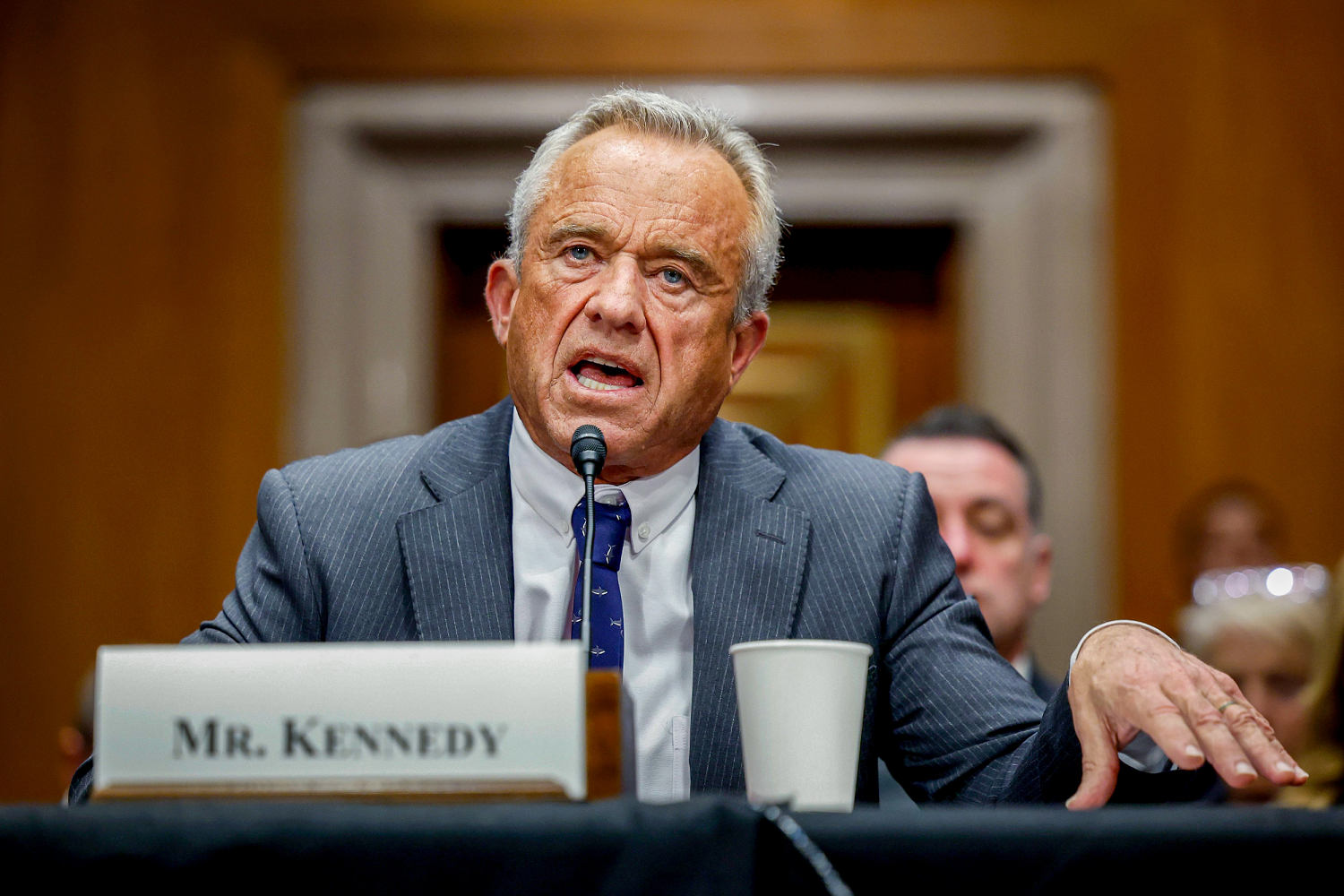When infection disease becomes chronic: Lessons from COVID and beyond

Robert F. Kennedy Jr., President Trump’s nominee for Secretary of Health and Human Services, said he will prioritize preventing chronic disease, shifting funding from vaccine and infectious disease research.
At first glance, this makes sense. The burden of chronic disease on individuals, families, communities, health care providers and, yes, taxpayers, is enormous.
Yet, chronic (that is, ongoing) and acute (meaning time-limited) diseases are closely linked. Treatments for infectious diseases often prevent the lifelong misery of chronic infections. Funding streams for both chronic and acute medical conditions are, and have always been, a critically conjoined public health need.
A century ago, in the pre-antibiotic era, rheumatic fever was a leading cause of children’s deaths. A child would get a strep infection, the untreated infection would develop into rheumatic fever and, for many, rheumatic heart disease. In the early 20th century, youngsters with this chronic condition occupied more pediatric hospital beds than all other infectious diseases combined
Specialty institutions, such as the Harriet Lane Home for Invalid Children in Baltimore, endowed by a wealthy family who lost two sons to rheumatic fever, opened in 1912 to offer long-term care to what some began to call “cardiac children.” It also cared for those with infectious disease and as a site for research and training in pediatrics.
Children with damaged hearts that could not be repaired lived with physical limitations and often faced shortened lifespans. Physicians counseled young women to avoid pregnancy so they didn’t stress their weakened hearts; the military barred young men with the condition from serving.
By the late 1940s, thanks to the development of penicillin, doctors could halt acute strep infections and prevent permanent damage to young hearts. Rheumatic fever ceased to be a common condition. Today, in the U.S., it is regarded as a preventable disease, and not all states require that it be reported.
Penicillin also halted the development of chronic conditions caused by untreated syphilis that appeared decades after infection. General paresis (neurosyphilis) once accounted for up to 25 percent of the admissions to psychiatric hospitals. Untreated syphilis also caused blindness, paralysis, organ damage to every organ and severe pregnancy complications, as well as fetal and neonatal deaths.
Today, unfortunately, rates of syphilis are increasing, as federal and state governments shift dollars away from case finding and prevention of sexually transmitted diseases. This is another reminder that efforts focused on infectious disease are critical to the prevention of chronic disease.
A more recent finding underscores the link between acute infections and chronic disease. Researchers have revealed that individuals born and infected during the 1918 influenza pandemic suffered two to three times the rate of Parkinson’s disease compared to those born before and after that outbreak. Careful study of chronic disease can reveal its source in prior infections.
Today, we have begun to learn this lesson again, in the wake of the now five-year-old COVID pandemic.
COVID is an acute, infectious disease caused, like the 1918 outbreak, by a virus. Long COVID, which manifests as a variety of ongoing debilitating symptoms, is now a critical area of study for chronic disease researchers, who are tracing various conditions back to the initial infection. The estimates of the incidence of long COVID among those infected in the U.S. is 14 percent.
What long COVID will mean going forward for those of us who have been infected and continue to face infections is uncertain. What we can be sure of is that it is dangerous to view acute infectious disease and chronic disease funding as a competition.
The historical record shows that the battle to prevent and find cures for infectious disease will lead to a lower incidence of chronic, disabling diseases. At the same time, efforts to find treatments and cures for chronic diseases is vital. Research in both areas is integral to the public health enterprise.
Janet Golden, Ph.D. Professor Emerita, Rutgers University, is a medical historian. Her most recent book is “Babies Made Modern: How Infants Brought Americans into the Twentieth Century.”
Topics
-

RFK Jr.'s insistence that the government ignores chronic disease is misguided
In his confirmation hearings, Robert F. Kennedy, Jr. said infectious diseases get more funding than chronic diseases. Government records suggest the opposite.NBC News - 1d -

Lessons from my investing career
The combination of leverage and time is a critical one to recognise in any portfolio blueprintFinancial Times - 3d -
RFK Jr. on chronic disease research
Sen. Maria Cantwell (D-WA) asked Robert F. Kennedy Jr. about National Institutes of Health research and innovation and expressed her concern on chronic disease emphasis, not infectious disease. RFK ...CBS News - 4d -
FDA approves Novo Nordisk's Ozempic to treat chronic kidney disease in those with diabetes, expanding its use
Expanded Ozempic approval in the U.S. could transform how doctors treat patients with chronic kidney disease, which involves a gradual loss of kidney function.CNBC - 4d -
Lessons on Authoritarianism From Around the World
Tyranny doesn’t happen overnight. Take it from the people who missed the first signs.The New York Times - Jan. 22 -

The rising threat of deadly diseases jumping from animals to humans
Zoonotic pathogens very likely caused the last pandemic. Can we get better at halting them before the next one?Financial Times - Jan. 10 -
Tax lessons for governments from Henry George
The 19th-century political economist understood that the whole of society should benefit from outsized profitsFinancial Times - Jan. 9 -

Meta Is Taking All the Wrong Lessons From X
By abandoning fact-checkers and loosening its Hateful Conduct policy, Meta has made clear the future it wants for its platforms.Wired - Jan. 8 -

Ohio's COVID-era health director becomes first Dem to file for governor
Former Ohio Department of Health Director Amy Acton announced Tuesday that she’s running for governor, becoming the first Democrat to enter the race to replace term-limited Gov. Mike DeWine (R). ...The Hill - Jan. 7
More from The Hill
-

Live updates: Lawmakers talk Mexico, Canada, China tariffs; Vance stands by Trump's DEI comments
President Trump imposed sweeping tariffs on Canada, Mexico and China this week -- defending his decision on Sunday and acknowledging there may be “some pain” caused by the economic fallout. Trump ...The Hill - 23m -

Canadian ambassador to U.S.: Canadians 'perplexed' and 'confused' by Trump's tariffs
Canada’s ambassador to the U.S., Kirsten Hillman, said on Sunday that Canadians are “perplexed” and “confused” by tariffs from President Trump. “Canadians are perplexed, I think disappointed,” ...The Hill - 40m -

Virginia Democrat says ‘buck stops’ with Trump after DCA crash
Rep. Eugene Vindman (D-Va.) said on Friday that President Trump should be accountable for potential issues that led to the deadly aircraft crash this past week, noting the incident occurred while ...The Hill - 50m -

SNAP shouldn’t subsidize America’s obesity epidemic
In its current form, SNAP operates as a de facto subsidy program that props up some of the unhealthiest parts of the food industry.The Hill - 1h -

Amo says Trump’s DEI remarks on plane crash ‘beneath the office of the president’
Rep. Gabe Amo (D-R.I.) on Sunday criticized President Trump for tying diversity, equity and inclusion (DEI) hiring practices to the plane crash near Washington D.C.'s Reagan National Airport. ...The Hill - 1h
More in Politics
-

Live updates: Lawmakers talk Mexico, Canada, China tariffs; Vance stands by Trump's DEI comments
President Trump imposed sweeping tariffs on Canada, Mexico and China this week -- defending his decision on Sunday and acknowledging there may be “some pain” caused by the economic fallout. Trump ...The Hill - 23m -

Canadian ambassador to U.S.: Canadians 'perplexed' and 'confused' by Trump's tariffs
Canada’s ambassador to the U.S., Kirsten Hillman, said on Sunday that Canadians are “perplexed” and “confused” by tariffs from President Trump. “Canadians are perplexed, I think disappointed,” ...The Hill - 40m -

Virginia Democrat says ‘buck stops’ with Trump after DCA crash
Rep. Eugene Vindman (D-Va.) said on Friday that President Trump should be accountable for potential issues that led to the deadly aircraft crash this past week, noting the incident occurred while ...The Hill - 50m -

SNAP shouldn’t subsidize America’s obesity epidemic
In its current form, SNAP operates as a de facto subsidy program that props up some of the unhealthiest parts of the food industry.The Hill - 1h -

Amo says Trump’s DEI remarks on plane crash ‘beneath the office of the president’
Rep. Gabe Amo (D-R.I.) on Sunday criticized President Trump for tying diversity, equity and inclusion (DEI) hiring practices to the plane crash near Washington D.C.'s Reagan National Airport. ...The Hill - 1h